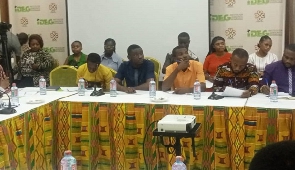 Participants of the IDEC youth engagement held on August, 1, 2023
Participants of the IDEC youth engagement held on August, 1, 2023
Institute for Democratic Governance (IDEG) has called for a partisan election of Metropolitan, Municipal and District Chief Executives (MMDCEs).
According to IDEG, most stakeholders in Ghana’s governance process believe that MMDCEs should no longer be appointed by the President of the Republic and that they should be elected, but they disagree on whether the election should be partisan or not.
Speaking at IDEG stakeholder engagement with youth leaders in Ghana on “Building National Consensus for Constitutional and Local Governance Reforms”, in Accra on August 1, 2023, a Senior Research Fellow, Prof Kwesi Jonah, stated why the election of the MMDCEs should be done on a political basis.
He said that if local government elections are done on a partisan basis, MMDCEs would have to fight the government on their own which would likely yield no results.
“Imagine yourself being a chief executive of a district and you are being treated unfairly (not receiving your command fund and so on). You, a single individual would have to face a whole national government,” he said.
The academic added that “But if there is a party behind you, your party would stand with you. So, this is what people don’t realise. So quite frankly I believe that if we go ahead with this election of MMDCs without political parties, after two elections people would be clamouring for the parties to come on board”.
On his party, the Executive Director of IDEG, Dr Emmanuel O. Akwetey, said that political parties are already involved in the work of MMDCs and their selection and this would worsen if they are elected without political parties.
“This whole idea that we can elect MMDCs without political parties flies in the face of the realities…The idea that we can have MMDCs with part interference… is not true,” he said.
He added that presidents of Ghana including Nana Addo Dankwa Akufo-Addo, and John Dramani Mahama have been complaining about MMDCs leaving their roles to become parliamentarians because of the fear of them being removed when their government is not in power which is hampering community development.
The stakeholder engagement heightened some reforms needed to enhance participation in governance, particularly at the local government level.
Some of the proposed reforms include the amendment of Article 55(3) to democratize local governance; the establishment of an independent Multiparty Democracy Commission (MDC) separate from the EC to register political parties, regulate their activities and print the technical and political support necessary for political parties to play their roles as principal actors in Ghana's democracy.
Other reforms include the creation of a Multiparty Democracy Fund (MDF) administered by the MDC to provide financial support for political parties and election candidates not only for the purpose al contesting elections but also for other activities such as policy research and Annual Policy Conferences to review party policies on Ghana's development and the adoption of a mixed member proportional representation (MMPR) system of election in local government.
BAI/NOQ
Ghana’s leading digital news platform, GhanaWeb, in conjunction with the Korle-Bu Teaching Hospital, is embarking on an aggressive campaign which is geared towards ensuring that parliament passes comprehensive legislation to guide organ harvesting, organ donation, and organ transplantation in the country.
Watch the latest episode of the Lowdown on GhanaWeb TV below: